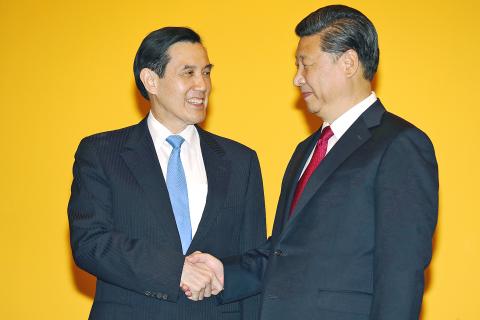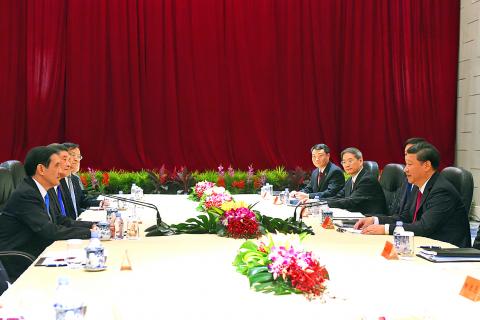President Ma Ying-jeou (馬英九) and Chinese President Xi Jinping (習近平) held a historic meeting in Singapore yesterday, the first time the leaders from both sides of the Taiwan Strait have met since 1949 after the Chinese Nationalist Party (KMT) was defeated by the Chinese Communist Party in the Chinese Civil War.
The summit, which began with the two exchanging an extended handshake before going behind closed doors, was trumpeted by Ma and Xi as a milestone in cross-strait relations.
“Today is a special day where leaders from two sides of the Strait meet,” said Xi, who was on a state visit to Singapore to celebrate the 25th anniversary of diplomatic ties between China and the Southeast Asian city-state.

Photo: AP
“Both sides of the Strait are brothers, a family of blood that is thicker than water,” Xi said in his opening remarks of the meeting at the Shangri-La Hotel.
Xi said: “We should let the world know with actions that Chinese on the two sides of the Strait are completely capable of solving our own problem with wisdom,” adding that both sides of the Strait have since 2008 moved toward a path of peaceful development and that people of the two sides have made great efforts to keep the cross-strait situation stable and harmonic over the past seven years.
“I hope that compatriots on both sides of the Strait can jointly uphold the [so-called] ‘1992 consensus,’ consolidate common political foundations, maintain the correct cross-strait development direction and jointly seek great invigoration of the Zhonghua minzu [Chinese ethnic group, 中華民族],” Xi added.

Photo: Taipei Times
The “1992 consensus” refers to a supposed understanding reached during cross-strait talks in 1992 that both Taiwan and China acknowledge that there is “one China,” with each side having its own interpretation of what that means. Former Mainland Affairs Council chairman Su Chi (蘇起) in 2000 admitted that he had made up the term “1992 consensus.”
Ma said that Taiwan would continue to consolidate the “1992 consensus,” maintaining the peaceful “status quo.”
He also called for lowering the state of hostility across the Strait and expanding cross-strait exchanges.
Ma said the “1992 consensus” was subject to the “one China” principle, neglecting to mention the “different interpretations” component that the KMT administration typically stresses.
During the meeting, Ma and Xi addressed each other as “mister,” rather than “president.”
While no agreements were signed and no joint statements were issued following the summit, China’s Taiwan Affairs Office Minister Zhang Zhijun (張志軍) told a post-meeting press conference that both Ma and Xi believe the “1992 consensus” should be upheld, as it “has great significance in promoting the long-term development of cross-strait relations.”
China and Taiwan both belong to “one China,” and dealings between the two sides are not “country-to-country” relations, nor a matter of “one China, one Taiwan,” Zhang cited Xi as saying.
Zhang said China welcomes Taiwan’s participation in the China-initiated Asian Infrastructure Investment Bank and its “One Belt, One Road” policy, adding that China is willing to consider and discuss the issue of Taiwan’s international space as long as Taiwan’s participation in regional economic integration and international activities “does not create the perception of ‘one China, one Taiwan,’ or ‘two Chinas.’”
Zhang quoted Xi as saying that “the forces seeking Taiwanese independence are the most real threat to cross-strait peace.”
Zhang said Xi agreed with Ma’s proposal to set up a cross-strait hotline, as it could help improve exchanges and dialogue.
Ma later told a separate press conference that he found Xi “pragmatic, flexible and frank.”
Ma said he hopes such a spirit could be reflected in the future handling of cross-strait matters.
During the meeting, Ma raised the issue of Taiwanese concern over China’s military deployment against Taiwan, he said.
According to Ma, Xi said that “the deployments do not target Taiwan.”
With regard to the “1992 consensus,” in response to reporters’ questions over Taiwan insisting that “one China” means the Republic of China, while Beijing emphasizes its “one China” principle, but intentionally ignores the latter part of the “consensus,” Ma said each side is free to interpret what “one China” means.
“That’s why some have said that [the ‘1992 consensus’] is a masterpiece of ambiguity,” Ma said.
Ma, who attended the closed-door meeting in the company of six other officials, said he found the summit helpful and positive, and reiterated that the purpose of the meeting with Xi was to take a first step toward paving a foundation so that a mechanism of institutionalized meetings between leaders from both sides of the Taiwan Strait could be established
From there, it can allow for the possibility of “super stable” cross-strait relations, he said.
Ma departed Singapore for Taiwan at 9pm on a charter flight after a dinner with Xi.
Later last night, Singaporean Prime Minister Lee Hsien Loong (李顯龍) posted a picture on Facebook of him having tea with Ma, adding: “Glad his meeting here went well. Hope this will lead to greater stability and prosperity for the region.”
Additional reporting by CNA

The CIA has a message for Chinese government officials worried about their place in Chinese President Xi Jinping’s (習近平) government: Come work with us. The agency released two Mandarin-language videos on social media on Thursday inviting disgruntled officials to contact the CIA. The recruitment videos posted on YouTube and X racked up more than 5 million views combined in their first day. The outreach comes as CIA Director John Ratcliffe has vowed to boost the agency’s use of intelligence from human sources and its focus on China, which has recently targeted US officials with its own espionage operations. The videos are “aimed at

STEADFAST FRIEND: The bills encourage increased Taiwan-US engagement and address China’s distortion of UN Resolution 2758 to isolate Taiwan internationally The Presidential Office yesterday thanked the US House of Representatives for unanimously passing two Taiwan-related bills highlighting its solid support for Taiwan’s democracy and global participation, and for deepening bilateral relations. One of the bills, the Taiwan Assurance Implementation Act, requires the US Department of State to periodically review its guidelines for engagement with Taiwan, and report to the US Congress on the guidelines and plans to lift self-imposed limitations on US-Taiwan engagement. The other bill is the Taiwan International Solidarity Act, which clarifies that UN Resolution 2758 does not address the issue of the representation of Taiwan or its people in

US Indo-Pacific Commander Admiral Samuel Paparo on Friday expressed concern over the rate at which China is diversifying its military exercises, the Financial Times (FT) reported on Saturday. “The rates of change on the depth and breadth of their exercises is the one non-linear effect that I’ve seen in the last year that wakes me up at night or keeps me up at night,” Paparo was quoted by FT as saying while attending the annual Sedona Forum at the McCain Institute in Arizona. Paparo also expressed concern over the speed with which China was expanding its military. While the US

SHIFT: Taiwan’s better-than-expected first-quarter GDP and signs of weakness in the US have driven global capital back to emerging markets, the central bank head said The central bank yesterday blamed market speculation for the steep rise in the local currency, and urged exporters and financial institutions to stay calm and stop panic sell-offs to avoid hurting their own profitability. The nation’s top monetary policymaker said that it would step in, if necessary, to maintain order and stability in the foreign exchange market. The remarks came as the NT dollar yesterday closed up NT$0.919 to NT$30.145 against the US dollar in Taipei trading, after rising as high as NT$29.59 in intraday trading. The local currency has surged 5.85 percent against the greenback over the past two sessions, central